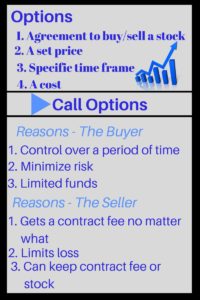What are stock options?
There are two types of options: a call and a put. But before we go into the specifics of each, let’s take a moment and just discuss the term “options”.
An option in it’s simplest form is a contract to buy or sell a specific stock at a specific price for a specific amount of time.
Once you have these four components: 1. an agreement to buy or sell stock 2. a set price 3. a specific amount of time and 4. a cost, then you have an option contract.
You can also listen to the podcast on these forums by clicking the images:
Understanding the two types of option contracts – Call Options
Call Options are one of the two types of option contracts. In general, if you are buying a call option you expect the stock to go up.
So let’s break down of how this works in an example:
Let’s say you have an iPhone 6 (64gb) and now Apple no longer makes the iPhone 6. What if I came to you and said I want to buy your iPhone 6 and I’m willing to pay $200 for it, but I don’t want it today, I want the right to buy it from August 1st, 2016 until October 31st 2016.
You say that is okay, but since I have to hold it just for you, to show you are serious you need to leave me a $50.00 non refundable deposit.
Let’s break down the contract here:
Stock = iPhone 6 (64gb)
Specific price = $200
Time frame = roughly 90 days, from August 1st, 2016 – October 31st, 2016
Cost = $50.00
We now have an option contract. Let’s try and understand the roles of the two people as you may be wondering why would anyone ever do that.
Person No. 1 – The Buyer of the Contract (me):
Why would the buyer like to enter into this contract?
1st reason: The iPhone 7 is rumored to come out in September, but critics say it will not have a headphone jack and will be made of cheaper material. The buyer believes the iPhone 6 will go up in price since there will no longer be a 64gb being made, and people will be outraged that there is no headphone jack. He believes the iPhone 6 will sell for minimum $400 after the news is released. He wants to lock down or control the phone for $50.00. He does not know for sure if the new phone will be better or worse, but he wants control over the phone just in case.
2nd reason: Perhaps the iPhone 6 value will drop as much as a $100 if the new iPhone 7 is a hit. The buyer does not want to hold onto the phone waiting for the news to be released, he just wants to control the phone and have the right to buy it later if he or she chooses to. Because let’s say I didn’t do an option contract, but instead just purchased the iPhone 6 outright for $200.00. But if the new 7 comes out and it is a hit, no one wants the 6 anymore so the price drops to $100.00. How much money did I loose? I lost $100.00 because I already gave the seller $200.00. Rather than take the risk of buying the iPhone 6 and waiting to see what happens, I would buy an option for $50.00. If the new 7 is a hit, all I lost was $50.00 controlling your phone. I limited my risk. If it goes higher, great, if not, I only lost $50.00.
3rd reason: The buyer currently does not have the $200 bucks to buy the phone but still wants in on the deal. No matter if the price goes up or down – he wants the option to buy the phone and sell it or keep it for himself. He wants to control the oportunity for 90 days to decide if the new 7 is a hit or not.
This comes into play because in the stock market world, you can now look at the bigger stocks: Google, Amazon, etc. They are expensive so you want in on the deal, but if you do not have that kind of money you can control it for about 90 days. Control an expensive asset.
Person No. 2 – The Seller of the Contract (you):
Why would the seller be interested in this contract?
1st reason: The seller thinks the new iPhone 7 will be awesome and doesn’t care about the headphone jack and neither will other people. So he’s happy to sell his phone for $200 and get paid $50 up front for a total of $250, which he can put towards the new iPhone 7. Compare that to actual stocks: you do not know if the stock is going to go up for sure, but you could get paid $50.00 today, no matter what.
2nd reason: If the new iPhone 7 is a hit and the price of his phone drops by $100, he still will get to keep the $50.00 that the buyer paid to enter in the agreement, thus limiting his loss and still getting to use his iPhone for three months. He got paid $50.00 for the contract and got $100.00 for t he phone, then he now has $150.00. If you paid $200.00 for the phone originally, your loss is now just $50.00 versus the $100.00 it would have been if you never entered the contract. Limiting the loss.
he phone, then he now has $150.00. If you paid $200.00 for the phone originally, your loss is now just $50.00 versus the $100.00 it would have been if you never entered the contract. Limiting the loss.
3rd reason: If the buyer of the option contract chooses not to exercise his option because he wants the new iPhone 7, then he gets to keep the $50.00 and keep his phone. He could still sell or trade his phone in to get the iPhone 7 or just continue to use as normal. In the stock market, if you own Apple stock at $200.00, the seller gets paid $50.00 for the right to purchase at $200.00 and if Apple stock stays the same (did not go up or down), the seller would keep the $50.00 and could still hold on to the stock.
How it all works in the End
Price goes down
Scenario 1: In the example we used above, if the price of the older iPhone 6 drops to $100, then the buyer of the option could just walk away from the deal. There is no reason for me to buy the phone at $200.00 if it fell to $200.00. I already paid $50.00, it does not make sense to purchase it for more than it is worth. In the stock market, I would not purchase the stock from you if it is higher than what is on the open market.
Scenario 2: The buyer of the option could exercise the option and still buy the iPhone 6 and just hold onto it hoping it increases in value. Keep in mind the phone would have to increase for more than the $50.00 paid for the option contract and the $200 paid to buy the phone for a total of $250 as the break even point. **Note in the real world, you would not buy a stock that is trading for $100 bucks for a cost of $200. You would ideally let the option expire worthless**
Price goes up
The price going up is the ultimate desired result. In the example we used above, what happens if the iPhone does become a classic and the price goes up to $400? At this point the buyer has two options.
Scenario 1: The buyer can come up with the $200 and buy the phone, and either use it for himself or turn around and sell the phone for $400. Thus resulting in a profit of $150.00.
Scenario 2: What if you cannot come up with the $200.00 to now buy the phone? The buyer, instead of buying the phone, can sell the option contract that cost $50 to someone for $400. Why? That contract controls the phone, and a buyer just may want the phone to use. This is the power of options: your piece of paper, the contract, can now be sold for $400.00. Now you made $350.00 vs buying the phone then selling it. See this person is not worried about making money off of the phone, they just want to own the phone and they would be willing to buy the contract just to own the phone. **Note: This in fact could even be the same person who originally sold you the $50 option contract to buy the phone from them in the first place**
Price stays the same
Similar to if the price goes down, the option buyer could walk away from the deal losing at most the $50.00 that went into it.
Confusion about Options
Can they force me to buy the stock and what if I don’t have enough money to buy it?
No, you cannot be forced to buy the phone in this example, or stock for that matter. However, if the iPhone 6 is worth more money than you paid for the option, you would consider selling your contract to someone else for a profit, especially if you did not have the $200 to take advantage of the price.
Once I buy an option am I’m stuck with it until expiration?
No, you are not stuck with it until expiration. If you get buyers remorse or should I say traders remorse a few weeks into it or up until expiration, you can always sell the option back to the market. Keep in mind, you may take a loss if time has passed or if the price of the stock has dropped since you bought it. For the option in the iPhone 6 example above, no one will pay the high price of $50 that you did when it had 90 days, and now only have 65 days left on the option and the price of the underlying asset has dropped.
In order to win in options trading, does someone have to lose?
This one couldn’t be further from the truth. Options can be a win-win situation for both. How? Well think about it in the iPhone example, if the price increases to $400, the buyer gets to buy it for $200 plus the original $50 contract for a total of $250 and sell it for $400 thus making a profit of $150. So the buyer wins.
The seller of the contract bought the iPhone 6 for let’s say $200, got to use the phone for a year and still get paid $200 plus the $50 for the contract for a total of $250 or a profit of $50. So the seller is happy.
Bottom line, someone does not always have to lose for someone else to win when it comes to options.
There are two sides to every stock option trade: the mindset that the buyer and seller are in. Then you have a market, an option, a mutual trade. Then from there, you can go into different strategies.
To dive in further to different option strategies, register for my free option webinar by clicking here
Discover how if you own stock, you can sell options against your stock without having to wait. You can limit your loss and see how if you are buying the option, you can control higher price stock without a bigger bank account. Register by clicking the link above or the image.


